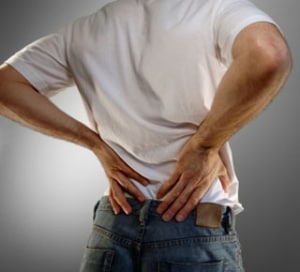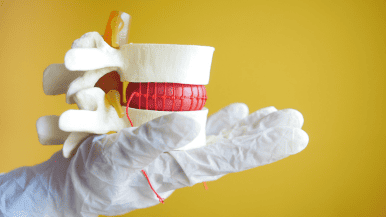Also referred to as a slipped disc or a ruptured disc, a herniated disc occurs when a disc in the spine (the soft, jelly-like interior between the spinal bones, known as vertebrae) begins to protrude out of the spinal column causing chronic discomfort and limiting movement.
What Are the Symptoms of a Herniated Disc?
 While some herniated discs may present no symptoms, others can irritate nearby nerves, which can produce constant pain. Common symptoms include:
While some herniated discs may present no symptoms, others can irritate nearby nerves, which can produce constant pain. Common symptoms include:
- Pain in the arm, leg, foot or back
- Pins and needles or numbness in the arm or leg
- Muscle weakness or spasms
What Causes a Disc to Become Herniated?
Herniated discs are generally a result of an aging body, known as disc degeneration. However, a herniated disc could also be the result of an injury brought on by improper lifting or twisting of the back.
In some rare cases, a herniated disc could be the result of a traumatic injury such as a fall or auto accident.
Can a Herniated Disc Be Prevented?
As mentioned before, disc degeneration, or aging discs, is the most common cause of a herniated disc. This means that as we age, our discs lose their water content (jelly) which makes them less flexible and more likely to tear or rupture.
Unfortunately, this shrinkage of discs is a natural part of aging and cannot be prevented. However, there are a few steps that can be taken to avoid an injury-induced herniated disc. These include:
- Avoid smoking
- Always lift properly
- Maintain a healthy weight
- Do not over-exert your back
Treatment Options for a Herniated Disc
Treatment for a herniated disc will depend on input from an orthopaedic specialist and the preference of the patient. Most herniated discs can be treated using non-surgical techniques.
These include:
- Over-the-counter pain medications
- Anti-inflammatories or muscle relaxers
- Alternating between hot and cold compress (only use heat if there are no spasms present)
A physician may also recommend limiting physical therapy to help prevent further injury. Strengthening exercise may be recommended as well as tips for proper posture. A spinal surgeon may also inject cortisone-type drugs to help alleviate nerve irritation.
With a severe herniated disc, the disc may become fragmented and pieces could be lodged in the spinal canal. In these cases, surgery is necessary to remove the fragmented pieces. Many spinal surgeries are minimally invasive and patients are back to their regular, day-to-day activities within just a few weeks of surgery.
Recovery After a Herniated Disc
After seeking treatment for a herniated disc, recovery time can vary greatly depending on these key factors:
- The progression of disc degeneration
- How long symptoms have been present
- Where the herniated disc is located
- Severity of nerve compression
- Length of specific treatment plan
Depending on the severity of the herniated disc, a mild case can last a little as one week where as a moderate case can last up to six weeks. In cases where surgery is necessary, recovery can take much longer. However, orthopaedic surgeons utilize minimally invasive procedures to help shorten recovery time for most individuals.
During recovery, a physician may recommend physical therapy to help a patient regain strength and stabilize the lumbar spine muscles.



